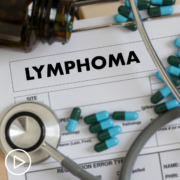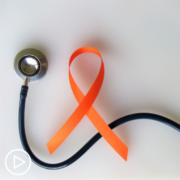Relapsed and Refractory Follicular Lymphoma | What Is It?
Relapsed and Refractory Follicular Lymphoma | What Is It? from Patient Empowerment Network on Vimeo.
What is relapsed and refractory follicular lymphoma? Cancer patient Lisa Hatfield explains the disease status and what these patients often commonly experience.
See More from START HERE Follicular Lymphoma
Related Resources:

|

|

|
Transcript:
Lisa Hatfield:
According to the Lymphoma Research Foundation, The term “relapsed” refers to disease that reappears or grows again after a period of remission. The term “refractory” is used to describe when the lymphoma does not respond to treatment or when the response to treatment does not last very long.
Although many patients go into a remission that lasts for years after their initial treatment, the disease can often return. For patients whose lymphoma relapses or become refractory, second-line therapies, which are treatments given when first therapy does not work or stops working, are often successful in providing another remission.
However, for some patients whose lymphoma relapses do not need treatment right away, and an “active surveillance” approach might be used. With this strategy (often called “watch and wait”), the person’s overall health and disease are monitored through regular checkup visits and lab and imaging tests. This may sound scary, but it’s better to wait than receive unnecessary treatment that could come with side effects.
If a patient starts to develop lymphoma-related symptoms or there are signs that the disease is progressing based on testing during follow-up visits, then treatment may begin again. The same therapies used for newly diagnosed patients can often be used in patients with relapsed/refractory FL. Depending on the timing of relapse, a patient’s doctor may repeat the same agent as their initial treatment. Treatment for relapsed/refractory FL is based on a patient’s age, overall health, symptoms, and the duration of remission from the last treatment they received.










